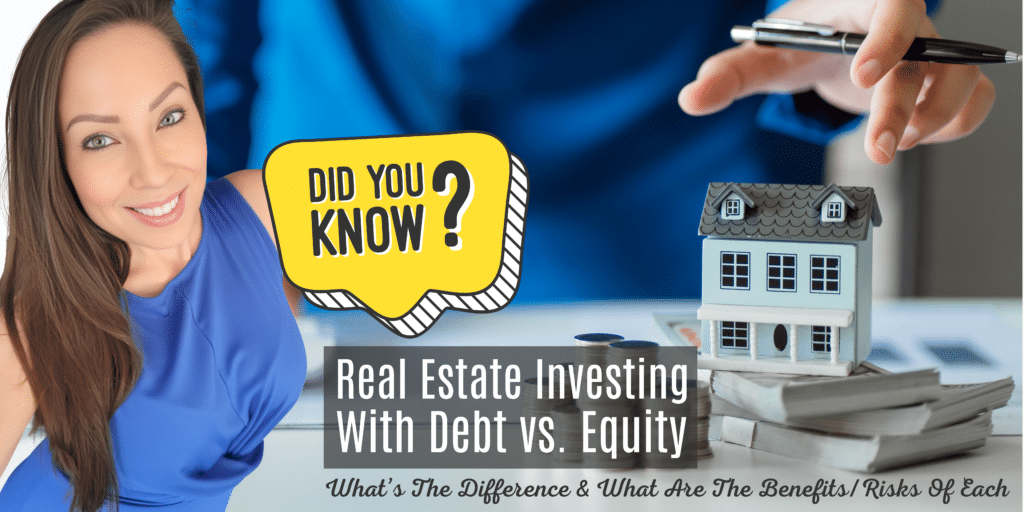
Real Estate Investing With Debt vs. Equity
What Investors Needs To Know
Investing in real estate offers a myriad of strategies, each with its own set of risks and rewards. Two primary methods are investing from a debt position and an equity position. Understanding these approaches is crucial for both active and passive investors. Let’s dive into what each method entails, their benefits, and their risks.
Debt Investment in Real Estate
Debt investment refers to providing a loan to a real estate project or property owner. In return, the investor receives regular interest payments and the return of principal at the end of the loan term.
From an Active Investor’s Perspective
Active investors, such as private lenders, actively seek out real estate opportunities where they can provide loans. They perform due diligence on borrowers and properties, set loan terms, and often engage in some level of oversight to ensure their investment is protected.
The Benefits
Predictable Income: Debt investments typically come with fixed interest payments, providing a steady and predictable income stream.
Lower Risk: As debt investors, they are higher up in the capital stack. In case of default, they get paid before equity investors.
Collateral: The loan is often secured by the property itself, offering a layer of security.
The Risks
Default Risk: If the borrower defaults, the lender might face delays or complications in recouping the investment.
Limited Upside: The return is capped at the agreed interest rate, so debt investors do not benefit from the property’s appreciation.
From a Passive Investor’s Perspective
Passive investors might invest in real estate debt through crowdfunding platforms, mortgage REITs, or debt funds. They rely on the fund managers or platform operators to handle the details.
The Benefits
Hands-Off Approach: Passive debt investments require minimal involvement, as professionals manage the loans.
Diversification: Investing in debt funds or REITs allows for exposure to multiple loans, reducing the risk of any single default.
Stable Returns: These investments often provide consistent returns through interest payments.
The Risks
Manager Performance: The success of the investment depends on the competency of the fund managers or platform operators.
Market Fluctuations: Interest rates and real estate market conditions can impact returns.
Equity Investment in Real Estate
Equity investment involves purchasing an ownership stake in a property or real estate project. Equity investors earn returns through property appreciation, rental income, and profits from sales.
From an Active Investor’s Perspective
Active equity investors are typically more hands-on, involved in property management, renovations, and strategic decisions. They might invest directly in properties or as part of a joint venture.
The Benefits
High Potential Returns: Equity investors benefit from property appreciation and rental income, offering significant upside potential.
Control: Active investors have control over property management decisions, allowing them to maximize value.
Tax Benefits: Equity investments can provide tax advantages, such as depreciation deductions and 1031 exchanges.
The Risks
Market Risk: Property values can fluctuate, and economic downturns can impact rental income and property appreciation.
Management Challenges: Active involvement in property management can be time-consuming and stressful.
Capital at Risk: Equity investors are last in line to be paid in case of a property’s financial troubles.
From a Passive Investor’s Perspective
Passive equity investors might invest in real estate through REITs, real estate crowdfunding platforms, or private equity funds. They rely on professional managers to handle property operations and strategic decisions.
The Benefits
Access to High-Quality Assets: Passive investors can gain exposure to large-scale properties and projects that would be difficult to invest in individually.
Diversification: REITs and funds often invest in a variety of properties, spreading risk across multiple assets.
Potential for High Returns: Equity investments can yield substantial returns through property appreciation and rental income.
The Risks
Market Volatility: The value of equity investments can be highly volatile, impacted by market conditions and economic factors.
Dependence on Management: The success of the investment heavily relies on the skills and decisions of the property managers or fund operators.
Liquidity Issues: Equity investments in real estate can be less liquid compared to other investment types, making it harder to exit the investment quickly.
Making the Right Choice
Choosing between debt and equity investments depends on the investor’s goals, risk tolerance, and desired level of involvement.
For Active Investors
Debt: Ideal for those seeking stable, predictable returns with lower risk and minimal involvement in property management.
Equity: Suitable for investors who are willing to take on higher risk for potentially higher returns and want to have control over property management and decisions.
For Passive Investors
Debt: Great for those looking for a hands-off investment with steady returns and lower risk. Options include mortgage REITs, debt funds, and crowdfunding platforms focused on real estate loans.
Equity: Best for investors seeking higher potential returns and willing to accept market volatility and dependence on professional management. Investing through REITs, real estate funds, and crowdfunding platforms provides access to diverse property portfolios.
Investing in real estate from a debt or equity position offers distinct advantages and risks. Debt investments provide stable income with lower risk, but limited upside potential. Equity investments offer higher returns through property appreciation and income, but come with greater risk and management challenges.
For active investors, the choice hinges on the desired level of control and risk tolerance. Passive investors should consider their need for diversification, income stability, and reliance on professional management. It’s also important to consider due diligence.
By understanding the nuances of debt and equity investments, investors can make informed decisions that align with their financial goals and risk preferences. Whether you’re seeking the steady income of debt investments or the high potential returns of equity investments, real estate offers a wealth of opportunities for those willing to navigate its complexities.
For plenty of other great content, make sure we’re connected on social @serenaholmesrealtor and you’ve subscribed to my YouTube Channel. And, for other articles specific to real estate investing, click here.
And, if you’re thinking about buying, selling or investing in Durham Region or Toronto, let’s chat! I can be reached at 647-896.6584, by email at info@serenaholmesrealtor.com or by filling out this simple contact form. You can also kick off your search for Durham Region homes for sale by clicking here.










